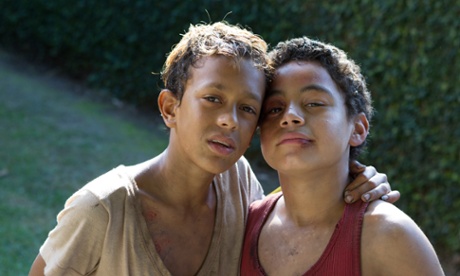
I imagine some books are long in the thinking-about, and I have heard about writers in their lonely attics labouring for years on some reluctant tale that just won’t get written or finished… but there are others that leap out and bite you right on the bum, as it were – like dogs – and you can’t shake them off.
Trash was a biter, and it bit me when I was a teacher in the Philippines, just four years ago. I was sent to a dumpsite in Manila with a class of 11-year-olds: a trip designed “to see how the poor lived”. We got off the bus, and gawped at the mess. We smelled the smell, and gazed at the trash-pickers as if they lived behind bars and we were at the circus.
It sounds shameful, doesn’t it? To visit a third-world dump to stare, and then go home again to TV and a three-course meal. That’s what we did, though – we stepped through the wardrobe for a moment into what was, to us, an upside down mad fantasy world of grimness.
But that’s how Trash came to be written.
I met some streetkids, and Rat was born. Raphael and Gardo were delivered soon after, based on the tenacious beggar boys who’d come out at night as the drinkers got drunker – never to fleece or steal, but always to charm and cajole and beg that little bit more.
Many of them had never seen a school, but spoke three languages. Their maths was impeccable, and without wishing to overdo the long-distance glamour, they displayed a survival instinct and a strength I found humbling.
The film director (Stephen Daldry) asked me at an early stage what he could do to destroy the book. “Disneyfy it,” I said. “Make the kids doe-eyed, cute and Dreamworks-cuddly – because that’s what they’re not. They’re made of steel.” He assured me he’d do no such thing: he cast three favela kids, with a charisma that lights up the screen – and when I met them on the set I’m afraid they broke me. To meet one’s own characters, forged the way you want them forged – that’s very special. What I love about the film is the way they lead it.
When I sat down to write Trash I kept one book on my desk: The Boy in the Striped Pyjamas. I wanted to write something as short, serious and wonderful. Okay, I didn’t succeed – but John Boyne’s book kept me going when I lost my way, and reminded me to work harder, because children’s fiction needs a bit of toughness. I wrote for 10 hours a day, but the ending eluded me – the boys would succeed, of course… but what would be their grand gesture?
What would they be driven to say? One particular night I set off down Manila’s mean-streets for a beer, just a typhoon rolled in off the sea. It was bending the trees, and blowing the trash up, out of the skips – a frightening, furious wind. That was what I’d been looking for, and I rushed home and scribbled the final chapters.
Every other book I’ve written has been turned inside and out by my editor – final draft turns into final draft two etc, and I return to rake over old scenes, cutting and stitching. Trash popped out like an egg, and we changed one word only: an obscenity that suddenly seemed crude in the mouths of those driven kids.
I’m far too close to the film to be objective. I watch it through a mist of tears, knowing that Mr Daldry tapped into the spirit of the book, which is the spirit of those children.
The film version of Trash, directed by Stephen Daldry, is out at the cinema now. You can buy Andy Mulligan’s book Trash from the Guardian bookshop.

